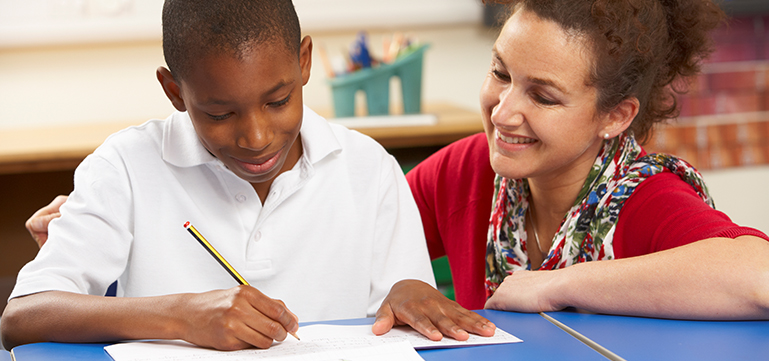Developing pupils as independent learners

Quick links:
Information about the school
Model Church in Wales Primary School is situated in Carmarthen. There are 412 pupils on roll between the ages of 3 and 11, including 55 pupils in the part time nursery. Around 13% of pupils are eligible for free school meals, which is below the national average (18%). A very few pupils speak Welsh at home. The school identifies that 24% of pupils have special educational needs. This is slightly above the national average (21%).
Context and background to the effective or innovative practice
The school is currently preparing for the new curriculum. As well as considering what is taught, it is also looking closely at how teachers teach. The vision of the school is to develop pupils as independent learners. In order to do this, the school believes that it needs to address pedagogy by extending the philosophy adopted in the foundation phase throughout the school.
Description of nature of strategy or activity
Following a visit to a local school that shared its successful practice, the school decided to create a ‘Ditectif Dysgu’. In particular, the aim of the school was to develop this approach to apply at key stage 2, and to build upon some of the key strengths of teaching and learning that is happening through the foundation phase philosophy. All enhanced provision work is now called ‘Ditectif Dysgu’, and every pupil has a ‘Ditectif Dysgu’ workbook and all six learning areas in the classrooms are known as ‘Cyfrif a Chyfrifo; Ardal Allanol; Gorsaf Ysgrifennu; Cwtsh Creadigol; Den Darganfod and Cornel Adlewyrchu’. The strategy ensures that pupils receive a broad and balanced content to their curriculum and a balanced approach to how they are taught. Therefore in key stage 2, staff decided to teach the more ‘subject’ content curriculum for three mornings a week. For the remainder of the time, pupils are taught in focus tasks and have the opportunity to work independently and in the enhanced provision areas. School leaders have ensured that throughout the school there are appropriate systems to ensure continuity.
The Year 6 comprises of two parallel classes, and ‘Ditectif Dysgu’ is provided across the year group. Maximum use of all of the learning environment is encouraged in both classrooms, including in the corridor and outside. Space and area location have been thought out carefully to accommodate Year 6 pupils. Every pupil is able to access all areas during ‘Ditectif Dysgu’ as the classrooms are ‘opened up’. As in all classes, ‘Ditectif Dysgu’ consists of two focus tasks, two independent activities and six enhanced provision areas, providing tasks of differing challenge and a range of relevant opportunities for formative assessment.
Planning is driven by pupils’ contributions and ideas and they are encouraged to contribute to the ‘Llais y Disgybl’ display during their weekly circle time. They then have the opportunity to select an activity from it during Ditectif Dysgu time.
What impact has this work had on provision and learners’ standards?
The impact of Ditectif Dysgu is that teaching in focus tasks across the year group allows the teachers to have contact with all the pupils on a regular basis. This ensures a deeper understanding of their ability and that of the holistic child, allowing accurate teacher assessment.
Teachers report a very positive impact in their pupils’ attitude to learning. The process has improved pupils’ independence, enthusiasm and attitudes to learning. Creativity and outdoor learning have also strengthened as pupils feel that ‘Ditectif Dysgu’ gives them far more opportunities to become independent learners. Staff have regular, meaningful opportunities to work with different pupils from both classes. Planning has also become more purposeful and considers all areas of learning. The pupils appreciate taking ownership of their own learning.
Nearly all pupils are fully engaged and enjoy their ‘Ditectif Dysgu’ time. They have developed a passion for their learning, and in particular the work has impacted positively on pupils’ learning, wellbeing and self-confidence.
How have you shared your good practice?
The school maintains contact with another school that staff visited to view and share good practice. The school is currently sharing successful practice through its school website and welcomes any school that wishes to express an interest to get in contact to find out more.